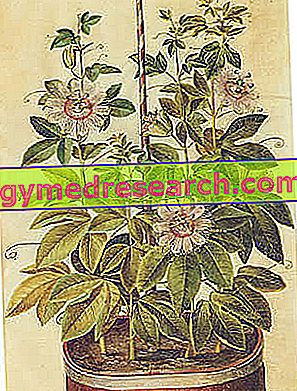Information disseminated by: |
| EMEA (European Medicines Agency) COMMITTEE FOR PLANT-BASED MEDICINAL PRODUCTS (HMPC) PASSIFLORA INCARNATA L., HERBA PASSIFLORA Summary of the HMPC assessment report for the public |
What are Passiflora-based medicines made of?

IMPORTANT NOTE: The illustration provided is to give more information on the source of the substance / plant preparation. This illustration is not intended to encourage harvesting in kind.
Passion flower medicines contain aerial parts (stems, leaves, flowers and fruit) of the passion flower plant. The Latin botanical name of the plant is Passiflora incarnata L. Passiflora is a climbing plant, herbaceous and perennial, originating in North America, Central America and South America. The plant is cultivated and harvested to obtain the parts dried aerial intended for medical use (vegetable substance). Passiflora-based medicines are available in various forms to be taken orally, such as herbal teas, tablets, capsules and drops and are obtained from various herbal preparations.
The preparations obtained from passion flower are also available in combination with other vegetable substances that have similar effects. The medicinal products resulting from these combinations will be the subject of a separate evaluation by the HMPC.
What are passion flower medicines used for?
Passion flower medicines are traditionally used to alleviate mild symptoms of mental stress and promote sleep in adults and adolescents over 12 years.
These instructions for use are based exclusively on traditional use.
Many traditional herbal medicines have not been subjected to a complete examination with current scientific methods. The Community pharmaceutical legislation provides the opportunity to officially register traditional plant-based medicines, based on their traditional use, if they can be used safely without the intervention of a doctor as regards diagnosis, treatment and follow-up. This traditional use must cover a period of at least 30 years, of which 15 years within the Community.
How are passion flower medicines used?
Passion flower medicines can be used from the age of 12. The use of passion flower medicines in children under 12 years of age is not recommended, as there is not enough information on the safety of the product for this age group.
The dosage and frequency of administration of passion flower medicines depend on the purpose for which they are used and the formulation of the medicine in question. For detailed instructions, refer to the leaflet accompanying each individual product.
They are generally taken three to four times a day. For further information see section 4.2 "Posology and method of administration" of the community monograph on herbs related to passion flower.
How do passion flower medicines work?
It is not known how passionflower medicines work in the treatment of mild symptoms of mental stress and in promoting sleep.
What studies have been carried out on passion flower medicines?
In order to demonstrate the efficacy of passion flower medicines, the HMPC examined data from the scientific literature as well as the results of four clinical studies conducted between 1998 and 2005. Studies on different types of passion flower extract were conducted in experimental models with the aim of demonstrating how passion flower medicines work. These studies have confirmed the known effects of medicines in inducing sleep and reducing the effects of anxiety, but it is not yet clear to what plant components these effects can be attributed. Other studies in experimental models have examined the way in which one of the components of passiflora can determine a reduction in anxiety at doses higher than those used in humans, but these studies have not clarified the action of passiflora-based medicines in cases of anxiety.
The results of the clinical trials were of limited value, because they involved too few patients, did not compare the passionflower-based medicines with other treatments, or examined the treatment of other disorders. However, one of the studies confirmed the use of passion flower medicines in relieving stress symptoms.
The HMPC noted that the traditional use of passion flower in the EU is widely documented by highly valued manuals spanning a period of at least 30 years. The first sources date back to 1938. Based on this long experience, the HMPC concluded that the efficacy of passion flower medicines is plausible, although further studies are needed in order to fully demonstrate their efficacy according to modern standards.
What is the risk associated with passion flower medicines?
Generally, passion flower medicines are well tolerated. A case of hypersensitivity (allergy) and a case of nausea and tachycardia (abnormal increase in the frequency of heart beats) have been reported in the literature. There are no findings of any kind about the possible harmfulness of passion flower medicines when used under normal conditions.
For the full list of side effects reported for a given passion flower medicine, see the Package Leaflet.
Passion flower medicines should not be used in people who may be hypersensitive (allergic) to passion flower.
As no tests have been carried out on the effects of passion flower medicines on reproduction or the fetus, as a precaution, these medicines should not be given to women during pregnancy or breastfeeding.
The traditional use of passion flower medicines indicates that they can cause drowsiness and reduce the ability to drive and use machines. Interested patients should not drive or use machinery.
More information on passion flower medicines
The use of passionflower as a medicine is part of traditional European herbal medicine.
Important information on the use of a traditional plant-derived medicine can be found in the leaflet accompanying each individual product. This information should always be read carefully before using a product.



